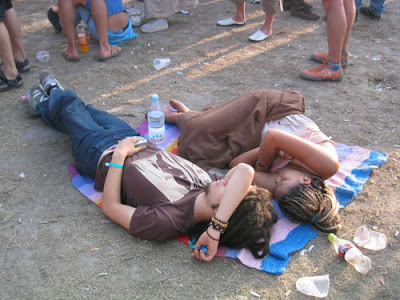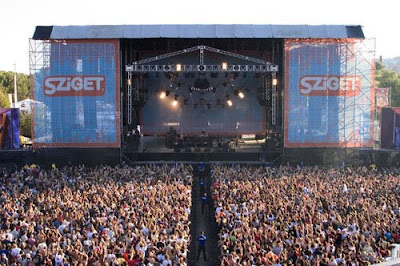The Sziget Festival is one of the largest music and cultural festivals in Europe, and more recently, in the world. The festival is held annually in August in Budapest, Hungary and takes place on Óbudai-sziget (”Old-Buda Island”), a landscaped island on the Danube, thus Sziget stands for Island. Currently it boasts more than 1000 performances each year.
 The week-long festival has grown from a relatively low-profile, gap-filling 1993 student event to become one of the definitive European rock festivals by the late 1990s, with about half of all visitors coming from outside Hungary, including the Anglosphere and France (11 000 French visitors in 2007). Attendancy rates surpassed the 250 000 mark in 1997 and the 350 000 mark in 2001.
The week-long festival has grown from a relatively low-profile, gap-filling 1993 student event to become one of the definitive European rock festivals by the late 1990s, with about half of all visitors coming from outside Hungary, including the Anglosphere and France (11 000 French visitors in 2007). Attendancy rates surpassed the 250 000 mark in 1997 and the 350 000 mark in 2001. Following the end of the communist era 1989, there were no longer organized camps for musicians to meet up and play, and hence a music festival was proposed as a way to bridge this gap. The festival was started in 1993, originally called Diáksziget (Students’ Island)
Following the end of the communist era 1989, there were no longer organized camps for musicians to meet up and play, and hence a music festival was proposed as a way to bridge this gap. The festival was started in 1993, originally called Diáksziget (Students’ Island)
Sziget Festival is notable in that it contains acts from many different genres. 2006 saw, among others, a blues stage, a jazz tent, a world music stage, alongside the main stage with more typical popular rock acts.




 In 2008, Sziget Festival was from the 11th to the 18th of August. The festival, instead of 7+1 days as in 2007, was 5+2 days long, with a “zero day” where the audience can watch one big concert (Iron Maiden) and a special “minus one day” called “Hungarian Song Day” where several classic Hungarian bands (including LGT, Beatrice and others) play gigs during the day.
In 2008, Sziget Festival was from the 11th to the 18th of August. The festival, instead of 7+1 days as in 2007, was 5+2 days long, with a “zero day” where the audience can watch one big concert (Iron Maiden) and a special “minus one day” called “Hungarian Song Day” where several classic Hungarian bands (including LGT, Beatrice and others) play gigs during the day.

 Being located on an island, some festival goers have tried to enter by swimming across the Danube or by paddling across in an inflatable raft. The organizers very much discourage these attempts claiming that it has never worked and that, due to the tricky nature of the fast-flowing Danube river.
Being located on an island, some festival goers have tried to enter by swimming across the Danube or by paddling across in an inflatable raft. The organizers very much discourage these attempts claiming that it has never worked and that, due to the tricky nature of the fast-flowing Danube river. This first event was organized by enthusiastic music fans in their spare time and ran well over budget, taking until 1997 to repay the losses. From 1996 to 2001 it was sponsored by Pepsi and renamed Pepsi Sziget. It has been called Sziget Festival (”island festival”) since 2002
This first event was organized by enthusiastic music fans in their spare time and ran well over budget, taking until 1997 to repay the losses. From 1996 to 2001 it was sponsored by Pepsi and renamed Pepsi Sziget. It has been called Sziget Festival (”island festival”) since 2002
 As well as Iron Maiden, R.E.M., Babyshambles, Sex Pistols, Jamiroquai, Anti-Flag, Flogging Molly, Alanis Morissette, The Killers, The Kooks, Kaiser Chiefs, The Cribs, Pendulum and many other were also confirmed, the day of their performance is available at the Sziget website. The length of the festival was reduced so that the residents living in the neighborhoods nearby would have less trouble because of the noise. The organizers plan to take further steps to reduce noise: the metal stage will be open until 11 pm only and noise filtering walls will be built near the noisiest stages.
As well as Iron Maiden, R.E.M., Babyshambles, Sex Pistols, Jamiroquai, Anti-Flag, Flogging Molly, Alanis Morissette, The Killers, The Kooks, Kaiser Chiefs, The Cribs, Pendulum and many other were also confirmed, the day of their performance is available at the Sziget website. The length of the festival was reduced so that the residents living in the neighborhoods nearby would have less trouble because of the noise. The organizers plan to take further steps to reduce noise: the metal stage will be open until 11 pm only and noise filtering walls will be built near the noisiest stages.
 A comprehensive survey was done and published on the risk taking behavior and mood of Sziget visitors (2007) by the National Institute for Health Promotion (OEI). The survey revealed amongst others that the last sexual encounter of 9.4% of its participants was unprotected
A comprehensive survey was done and published on the risk taking behavior and mood of Sziget visitors (2007) by the National Institute for Health Promotion (OEI). The survey revealed amongst others that the last sexual encounter of 9.4% of its participants was unprotected


 The festival is popular with west Europeans. Around 50% of visitors come from outside Hungary, with the largest group coming from Germany. Many also come from the UK, France, Italy and The Netherlands
The festival is popular with west Europeans. Around 50% of visitors come from outside Hungary, with the largest group coming from Germany. Many also come from the UK, France, Italy and The Netherlands


Sziget festival in Hungary
Subscribe to:
Post Comments (Atom)

0 comments:
Post a Comment